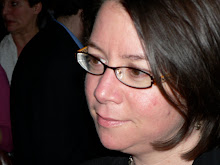Aaron's fourth grade class was supposed to do a unit on "Explorers," integrating their study of Washington state history with the literary genre of biography. But his teacher found that the selection of explorer biographies at a fourth grade reading level was unacceptably white and male. So she broadened it to "Changemakers," and had them put on a "wax museum" in which the kids embodied a gorgeously diverse crowd of leaders -- including Helen Keller, Rosa Parks, Marco Polo, the Lakota Sioux cousins Tatanka Iyotake and Tasunka Witko (Sitting Bull and Crazy Horse), Harriet Tubman, Sacajawea, Malala Yousafzai, Gertrude Bell, Abraham Lincoln, Neil Armstrong, Annie Oakley, and Juliette Gordon Low. You want to talk about changemakers? Talk to me about the elementary school teachers.
Of course the terrifically committed kids made it fantastic. They dressed, spoke, and acted as their characters (having researched appropriate dress), which is a developmentally awesome way for fourth graders to do experiential learning. I loved how respectful and informed they were about what they were wearing, while also being completely noncommercial and creative. They also painted portraits of their character and made a poster to present everything they had learned. Each poster had a paper button on it that you could press to signal the kid to talk about a particular aspect (childhood, achievements, fun facts). When not speaking, the students posed like statues, hence the "wax museum." Here is Aaron as Crazy Horse.
Alma as Pocahontas.
Amara as Helen Keller. Embodying Helen Keller posed a challenge for oral presentation; Amara addressed this challenge by tapping her computer keyboard to present PowerPoint slides, which surely is what Helen herself would have done in this day and age. Note her distant gaze!
Eyal and Talia, both as Neil Armstrong. Talia had a helmet but she had taken it off at the moment.
Ayla, as Rosa Parks, wearing business attire. I was particularly moved by her painting.
Diego as Malala Yousafzai.
Hannah as Harriet Tubman.
Lily as Gertrude Bell, an extraordinary explorer I had never heard of who, among many other achievements, helped establish the modern state of Iraq. Check out that incredible portrait.
Marni as Abraham Lincoln.
Maya as Tatanka Iyotake (Sitting Bull).
Adam, Aviva, and Anna as Marco Polo, Juliette Gordon Low, and Annie Oakley.
Thank you Dale for the gorgeous pictures!
































